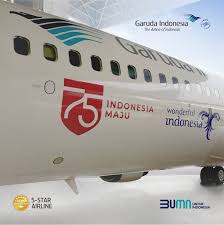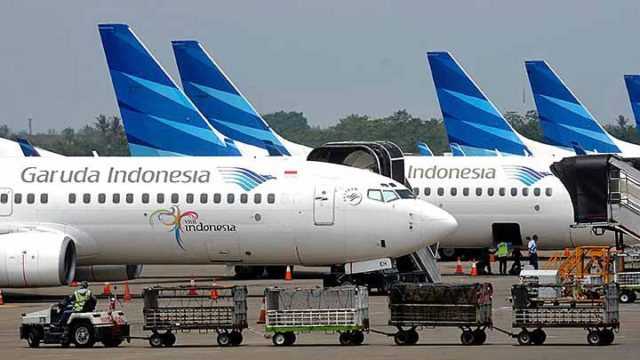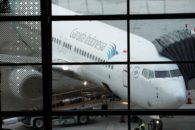The Jakarta Post report that the financially-troubled National Flag Carrier Garuda Indonesia has set aside any plans to renew or rejuvenate its aircraft fleet.
The global downturn in air travel has worsened Garuda’s already precarious financial position and made the acquisition of new aircraft economically non-viable.

Confirming the necessary decision to conserve cash and reduce expenditures, Garuda Indonesia’s CEO, Irfan Setiaputra, told The Jakarta Post that most of the Airline’s fleet remains parked because of a lack of both operating flights and passengers. Setiaputra added: “What is the world going to say if we have a new aircraft while many aircraft are parked on the ground? It doesn’t make any sense.”
At the same time, Garuda’s Chief Executive quickly pointed out that the National Carrier’s armada is relatively new. Garuda, and its subsidiary Citilink Indonesia, currently own 20 aircraft and leases 190 more aircraft with an average age of 7.8 years. This compares favorably with U.S. carriers, where The U.S. Bureau of Transportation shows the average age of aircraft was 13.3 years in 2019.
“What is the world going to say if we have a new aircraft while many aircraft are parked on the ground? It doesn’t make any sense.”
Garuda Indonesia, CEO, Irfan Setiaptutra
Garuda Indonesia has seen its income plummet as international traffic has almost ceased due to closed international borders and domestic travel diminish to a fraction of past levels in the face of the battered economy and stringent health protocols.

Garuda’s operational reports reveal an “aircraft utilization rate” was 4 hours and 19 minutes per day in July compared to 8 hours and 14 minutes in July 2019. Similarly, Garuda Indonesia’s passenger numbers for the first seven months of 2020 reached 6.89 million passengers, a drop of 54.4% year-on-year.
During the first six-month of 2019, Garuda booked a modest profit of US$24.11 million. As the global pandemic worsened and flights were curtailed or canceled, Garuda Indonesia reported losses of US$712.73 million during the first semester of 2020.
Irfan Setiaputra confirmed that Garuda is currently working to renegotiate lease agreements and restructure the Company’s debt, while also seeking new terms from major suppliers. “When the pandemic hit, we contacted our lessors and renegotiated our leasing schemes, debt restructuration, leasing cost restructuration, and [more],” he said while affirming that these talks are yielding positive results.
“Some of the lessors have verbally agreed [to the renegotiated terms]. We only need to write the legal papers, and we can execute it once our payment arrears are paid,” he explained.
Information just published by Mirae Asset Sekuritas confirms that Garuda has successfully deferred rental payments for 40 aircraft due in Q2 of 2020, resulting in a cost-saving of US$100 million. Separate negotiations with 12 lessors have netted an additional savings of US$30 million due in the current year.
Staff reductions, early retirement, and wage cuts have been implemented by Garuda to reduce operating costs. Setiaputra said: “We keep our early retirement package proposals rolling and, as of today, around 500 employees have applied for the program, even though we haven’t executed it yet.”
Reduced operations and management steps have reduced Garuda Indonesia’s operation expenses to US$1.6 million or by 22% year-on-year for the first six months of 2020.
The Jakarta Post says Garuda booked negative equity at the end of the second quarter of 2020 at US$80.8 million, down from the positive equity of US$720.6 million listed at the end of 2019.
The Indonesian Government promised in July, via a decree issued by the House of Representatives (DPR), to provide Mandatory Convertible Bonds (MCB) worth US$583 million. In the opinion of financial analysts at Garuda, however, these promised funds will be insufficient to salvage the Airline from its growing mountain of debt and continuing poor financial performance.
In a just-published study by Mirae Asset Sejuritas, analyst Lee Young Jun projects the Airline to record a loss of US$1.1 billion for all of 2020 and a further US$161.5 million loss in 2021. These assumptions are based on estimates that Garuda Indonesia will “at best” achieve an average seat occupancy of 40% through the end of 2020 and notes a growing prevalence of extended large-scale social restrictions (PSBB) as a continuing threat dissuading the public from traveling.
Garuda Indonesia stocks traded on the Indonesian exchange have lost 51.41% of its value since the beginning of 2020.
The Airline’s stock was trading at a record low of Rp. 240 per share on 15 August 2020 – a rate of less than US$0.02 per share.
Related Articles
Only Passengers Can Save Garuda Indonesia




